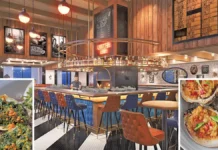
Article contributed by Cris Grossmann, CEO and co-founder of Beekeeper
Chaos is a natural part of frontline work, especially in the food service industry. When you’re dealing with people on a daily basis — whether you’re taking orders, preparing food or cleaning up after a messy group of customers — you will inevitably run into unpredictable problems and disruptions. For that very reason, it’s imperative that every other aspect of the job is dependable and consistent.
At the most basic level, that means flexible and reliable shift coordination. At many restaurants today, coordinating and communicating shifts to employees happens through a patchwork of forms, paper bulletins, phone calls or group texts, and the results are often far from effective. When employees don’t find out their schedules until the last minute, they miss shifts, they can’t balance work and life well, and their work inevitably suffers.
By granting employees flexibility (and more control) over their working hours — using technology to streamline the process and heighten transparency — restaurant managers can fill shifts more effectively, improve workplace satisfaction and inevitably drive better team performance.
The downsides of poor shift scheduling
To understand why proper shift coordination is so important, let’s briefly put ourselves in the shoes of a restaurant employee.
Picture this: it’s 8 p.m. on a Sunday. Usually on Monday the kids have after-school activities to keep them busy, but this Monday all their after-school activities are canceled — the teachers are doing their quarterly training exercises. If you’re not working, this won’t be a problem, and you’ll be home to watch over them. If you are working, though, you’re going to need to line up child care. The problem is any kind of childcare needs a certain amount of advance notice — and you still, despite the late hour, have no idea when or if you’ll be working tomorrow.
If this happened only rarely, it would be stressful but manageable. The problem is that in many restaurants it happens all the time. According to a study from researchers at UC Berkeley and UC San Francisco, 37% of service-sector workers do not have regular schedules, 16% receive schedules with less than a few days’ notice and nearly as many have shifts canceled at the last minute. Because of this, 45% of service-sector workers report feeling distressed.
 Additionally, unstaffed shifts degrade productivity and output quality, and a lack of shift flexibility can contribute to burnout and increased employee turnover. In fact, Beekeeper’s 2023 Frontline Trends Report found that predictable and flexible shifts are top retention drivers for frontline teams.
Additionally, unstaffed shifts degrade productivity and output quality, and a lack of shift flexibility can contribute to burnout and increased employee turnover. In fact, Beekeeper’s 2023 Frontline Trends Report found that predictable and flexible shifts are top retention drivers for frontline teams.
However, shift scheduling doesn’t just affect restaurant workers on the frontline of the business. It also impacts managers, who have to spend valuable working hours calling around to check availabilities and make sure all shifts will be covered. Poor shift scheduling means increased absenteeism, which inevitably leads to reduced customer satisfaction and a higher volume of complaints.
While shift scheduling might seem like a small part of any restaurant, it can actually affect almost every aspect of the business’ day-to-day affairs, from employee morale to revenue and customer satisfaction revenue.
Why optimized shift scheduling matters
While most restaurants have adopted new technology to enhance the customer experience from POS systems to inventory to takeout ordering, many restaurants are still scheduling shifts like it’s 1985. Shifts are often posted on a piece of paper on the hallway bulletin board, filled with half-legible scrawls, hasty crossings-out and incorrect or outdated information.
To know when they’re expected to show up for work, employees have to crowd around the bulletin board and squint, call in to ask other employees to squint for them or drive — sometimes hours — to the restaurant to see the new schedule. In this way, valuable time is lost, and, more often than not, employees remain frustratingly under-informed on when and where they’re supposed to be working.
This problem can easily be solved with the help of shift coordination technology in a frontline success system. For starters, a frontline success system can easily be accessed on any smartphone, so as soon as a manager publishes the new schedule, every employee can immediately access it. Frontline success systems also give employees the power to switch shifts in real time, instantly flag unavailability and easily create digital shift handover notes.
By giving employees shift flexibility and improving communication around shift coordination, restaurants will improve employee morale, which leads to better employee retention rates and less turnover, and happy employees are more likely to refer friends and acquaintances for open positions. With reduced absenteeism, every shift will be more productive and efficient, and managers will spend less time updating and printing out schedules and more time ensuring the restaurant is operating at its very best.
Adopting a frontline success system with shift coordination technology is a win for everyone. Employees have more agency, managers deal with less scheduling stress, customers get a vastly improved experience, and the business sees improved ROI. While proper shift scheduling might seem like a small thing, it can make a world of difference in the hectic food service industry.
Cristian Grossmann is the CEO and co-founder of Beekeeper, which solves the disconnect between frontline workers and their managers in the retail, hospitality, manufacturing and construction industries. Cristian, a former frontline worker himself, understands first-hand the technology that is required to make the frontline workforce more effective. Prior to founding Beekeeper, he worked for Accenture on high profile international projects in the field of IT Strategy for the financial and public sectors. Cristian studied Chemical Engineering and got his Ph.D. in Electrical Engineering, both at ETH Zurich. Before moving to beautiful Zurich, he was born and raised in an entrepreneurial Swiss-Mexican family in Mexico City.

























